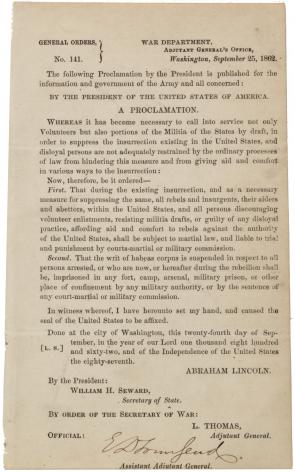The Writ of Habeas Corpus
"You have the body."
There's an ancient writ. Whenever any trial is held in a court of law, the bodies of all the participants and parties to the proceedings are required to be physically present in court.
Video arraignments and telephonic hearings are absolutely prohibited by the ancient Writ of Habeas Corpus.
The Writ is only suspended temporarily and not under any circumstances indefinitely in cases of riot or public unrest, and it does not require any sort of petition or pleading. A lawful jailbreak is authorized.
A proclamation on the suspension of habeas corpus, 1862 | Gilder Lehrman Institute of American History
A proclamation on the suspension of habeas corpus, 1862 | The doctrine of habeas corpus is the right of any person under arrest to appear in person before the court, to ensure that they have not been falsely accused. | The doctrine of habeas corpus is the right of any person under arrest to appear in person before the court, to ensure that they have not been falsely accused. The US Constitution specifically protects this right in Article I, Section 9: “The privilege of the writ of habeas corpus shall not be suspended, unless when in cases of rebellion or invasion the public safety may require it.” Lincoln initially suspended habeas corpus in the volatile border state of Maryland in 1861 in order to try large numbers of civilian rioters in military courts and to prevent the movement of Confederate troops on Washington. The order was eventually extended in response to different threats. In the summer of 1862, President Lincoln had called up the state militias, leading to increased opposition to the Civil War within the Union. By General Orders No. 141, September 25, 1862, Lincoln subjected protestors to martial law and the suspension of habeas corpus. The suspension of habeas corpus was one of Lincoln’s most controversial decisions. In the spring of 1863, General Ambrose Burnside arrested Peace Democrat Clement Vallandigham, who had been critical of the US government, and banned publication of the Chicago Times, which was supportive of Vallandigham. Burnside’s actions drew widespread criticism, to which Lincoln responded by reducing Vallandigham’s sentence and revoking Burnside’s order suppressing the Times. Lincoln defended himself against charges that his administration had subverted the Constitution, however, arguing that acts that might be illegal in peacetime might be necessary “in cases of rebellion,” when the nation’s survival was at stake.

The Constitution of the United States: A Transcription
Note: The following text is a transcription of the Constitution as it was inscribed by Jacob Shallus on parchment (the document on display in the Rotunda at the National Archives Museum). The spelling and punctuation reflect the original.

Article I. § 9. ¶¶ 2–3. The Privilege of the Writ of Habeas Corpus shall not be suspended, unless when in Cases of Rebellion or Invasion the public Safety may require it. //No Bill of Attainder or ex post facto Law shall be passed.
Habeas Corpus Act 1679
An Act for the better secureing the Liberty of the Subject and for Prevention of Imprisonments beyond the Seas. … Recital that Delays had been used by Sheriffs in making Returns of Writs of Habeas Corpus, &c. … WHEREAS great Delayes have beene used by Sheriffes Gaolers and other Officers to whose Custody any of the Kings Subjects have beene committed for criminall or supposed criminall Matters in makeing Returnes of Writts of Habeas Corpus to them directed by standing out an Alias and Pluries Habeas Corpus and sometimes more and by other shifts to avoid their yeilding Obedience to such Writts contrary to their Duty and the knowne Lawes of the Land whereby many of the Kings Subjects have beene and hereafter may be long detained in Prison in such Cases where by Law they are baylable to their great charge and vexation. … Sheriff, &c. within Three Days after Service of Habeas Corpus, with the Exception of Treason and Felony, as and under the Regulations herein mentioned, to bring up the Body before the Court to which the Writ is returnable; and certify the true Causes of Imprisonment. Exceptions in respect of Distance. …

